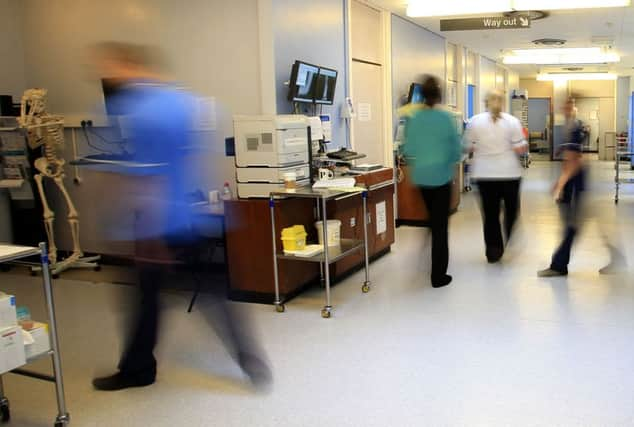1100 patients wait over a year for NHS treatment in Scotland


Opposition politicians said the waits endured by patients were a “damning indictment” of Nicola Sturgeon’s SNP administration handling of the health service. The figures released under Freedom of Information legislation reveal that 1,186 people waited more than 12 months to be treated in hospital last year. One patient waited more than four years for treatment.
The figures, obtained by the Scottish Conservatives, from the NHS’s Waiting Times DataMart showed a dramatic increase on the 228 patients who were forced to wait over a year in 2015.
Advertisement
Hide AdAdvertisement
Hide AdThe rising number of patients forced to wait more than a year led to medical organisations expressing concern about the doctor and staff shortages plaguing the NHS.
The statistics will also pile pressure on the Health Secretary Shona Robison, whose management of the health brief is under increasing scrutiny from her opponents.
Analysis of the figures showed there has been a deterioration in waiting times performance since 2011 when just nine patients were stranded on waiting lists for more than a year.
The figure rose to 77 in 2012, leaping to 365 in 2013 before easing to 179 in 2014.
In 2015 an upward trend was observed once more with 228 waiting more than a year before more than quadrupling to 1,186 last year.
The 1,186 total included 16 patients waiting more than two years.
The specialisms with the most patients waiting more than a year were urology with 303, trauma and orthopaedic surgery (277) and endocrinology and diabetes (176).
They were followed by: gastroenterology (170); immunology (64); ear, nose and throat (50); ophthalmology (50); dermatology (18) and gynaecology (11).
Advertisement
Hide AdAdvertisement
Hide AdThe longest wait was for ear, nose and throat treatment with one patient waiting 234 weeks – well over four years.
One immunology patient waited nearly two years (91 weeks) and one gynaecology patient waited 182 weeks while three patients waited 65 weeks for endocrinology and diabetes treatment.
Scottish Conservative shadow health secretary Miles Briggs said: “This is just another measure which shows a real collapse in the standard of service being offered to patients. That’s not the fault of hardworking staff – this is all on an SNP government whose shoddy forward planning has led to these unacceptable delays.
“To see these statistics shoot up by more than 400 per cent in the space of just a year is remarkable.
“Nobody should have to wait longer than a year for care, and that used to be the case, according to these figures.
Mr Briggs added: “But now more than 1,000 people were forced to wait beyond the 12-month mark, and some for considerably longer – that’s a damning indictment of the SNP’s disastrous stewardship of the NHS.”
Margaret Watt, the chair of Scotland Patients’ Association, said: “We should be worried about this. What we need to know is whether it is down to a shortage of staff or is the system struggling to cope with those coming in.
“The longer patients have to wait the worse their conditions become. Long waits cause stress and anxiety and that doesn’t help illnesses. These cases may not matter much to the government but they certainly matter to the patients involved.”
Advertisement
Hide AdAdvertisement
Hide AdMedical organisations have warned that NHS staff are under huge strain and that NHS funding is failing to keep pace with demands on the service.
The most recent figures show that there are 400 unfilled consultant posts in Scotland, increasing by 17.6 per cent between March this year and last year. The strain on the system has seen 20 operations per day cancelled since the beginning of the year.
It is not just hospitals that are feeling the pressure. Similar recruitment problems are being experienced across the NHS.
Earlier this week a report by the Royal College of General Practitioners predicted a shortfall of 828 GPs across Scotland by 2021, and highlighted 2,800 nursing vacancies.
The RCGP also claimed health boards had failed to recruit sufficient numbers of pharmacists trained to work in general practice.
In a hard-hitting consultation paper, the Royal College of General Practitioners (RCGP) Scotland described patients queuing outside practices just to register with a doctor, and warned that plans for nurse practitioners to care for patients without doctor support puts people at risk.
In recent weeks Ms Robison’s record has been criticised over the reduction in the number of beds at St John’s Hospital, Livingston, and the temporary closure of a ward at the Royal Hospital for Children in Glasgow.
Earlier this month the crumbling state of NHS buildings was revealed in research which found mental health facilities, maternity units and some of Scotland’s largest acute hospitals were among those in urgent need of repair.
Advertisement
Hide AdAdvertisement
Hide AdBuildings were at risk from a variety of problems including legionella and asbestos. There were questions over fire safety and electrical issues.
Despite the Scottish Government’s promise to invest £1.2 billion in the NHS, health board responses to Freedom of Information requests identified buildings at “significant” or “high” risk and required investment or replacement.
Health Secretary Shona Robison defended the government’s health record and pointed out that hundreds of millions had been spent on initiatives to try and turn round the problem.
Ms Robison said: “We remain committed to ensuring patients get quick access to the services they require.”